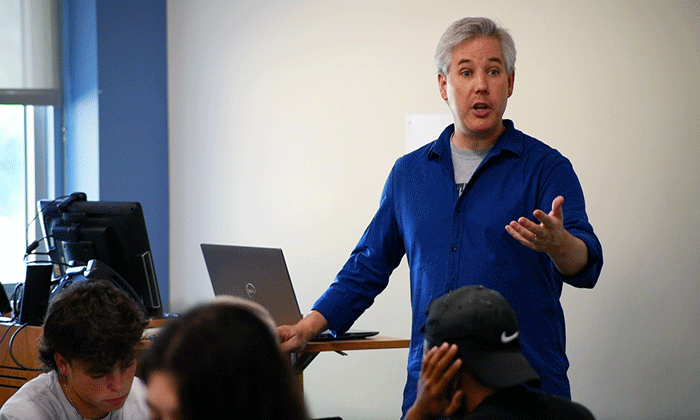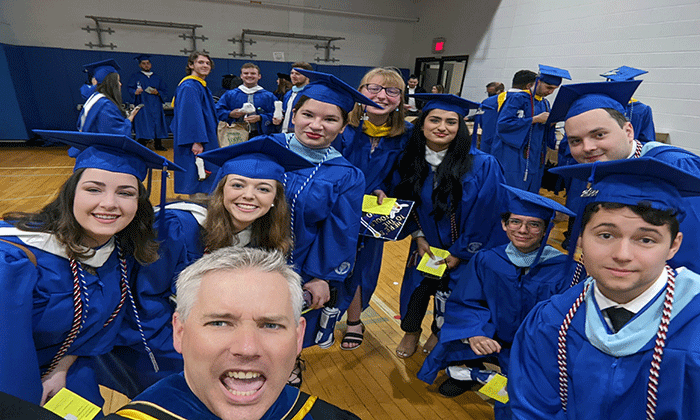In this episode of “Faculty in Focus,” we catch up with Dr. Chad Rector, Associate Professor of Political Science within the College of Sciences and Humanities at Marymount, to discuss his forthcoming book that focuses on the possible reunification of North and South Korea, the ramifications of such actions being taken in today’s political climate and suggestions towards a peaceful solution.
Why Marymount?
I like being able to teach at a small university where I really get to know the students who take my courses. Because I have students in multiple courses over their time here, I really get to work intensively with them in order to help them develop their writing skills and assemble a research portfolio of interest that they can bring into the job market for their future careers. I like this method of teaching because I get to learn about the kinds of things that they’re interested in and adapt the kinds of things that they do in their courses and in their individual projects to help them succeed later in their life. I really like this teaching model a lot more than the classic “sage on the stage” style of a bigger university. That was the appeal of Marymount for me from the very beginning, and it’s why I stayed here as long as I have.
Why political science?
The reason that political science interests me is twofold. I like the types of puzzles that we study, as they are really important for the future of humanity. Puzzles such as trying to figure out why some countries become rich and prosperous while others do not, or why countries start wars instead of trying to resolve things peacefully. Knowing that these types of questions I work on are vitally important for so many people is what drives me. I also think the puzzles that we study are just intrinsically interesting. I study how countries sometimes are able to cooperate with each other even when one of them is untrustworthy — that’s just interesting. It’s fun to try to work through the puzzles of how international diplomacy can work under some extremely difficult conditions. It’s almost like a game where you try to solve puzzles, and I just find that engaging.
How has your teaching style changed over the years?
I think the biggest thing that’s changed about my teaching since I’ve been at Marymount is that I’ve become a lot more flexible in how I approach students as individuals with their different interests, challenges, strengths and weaknesses that they bring here. When I first started teaching, I had a very rigid approach. The thing that I learned is that students have different kinds of learning styles and strengths. Some students are engaged in one kind of puzzle, maybe a more abstract logical puzzle, whereas other students are more motivated by very specific concrete real-world problems.
Now, it’s figuring out what kinds of aptitudes, interests and strengths that different students have, and then I teach students individually to develop a plan to figure out how they’re going to turn their interests into future successes. That is interesting and challenging and I really enjoy doing that, but it’s also a big shift from how I started off teaching. I started off teaching at much bigger universities where I would just lecture to a classroom — in some cases as many as 300+ students at a time — and I wasn’t adopting things individually to students. Now, I do that much more and I find that much more rewarding and valuable for both myself and the students.
What do you hope students gain through your political science classes?
One of my biggest goals in all of my courses is to try to encourage and teach students both the skills and the value of taking a step back and thinking analytically about problems, rather than sort of accepting conventional wisdom or engaging in magical thinking. I want them to think analytically about what kinds of people are involved in a particular social or political controversy, what their goals are and what they’re trying to accomplish by the choices that they make. Then, if we’re interested in changing the way our political system or society works, what kinds of little tweaks can we make to political institutions or decisions we can make in order to try to lead to more productive outcomes.
What I want students to do is learn to empathize — to understand the perspectives and points of view of people who they may disagree with about important political, cultural or social issues. Then, use that understanding to develop a fuller picture of how our society works. Ultimately, I want them to learn that if we want to change the way things work, we really need to start with a good understanding of what kinds of social institutions and political dynamics lead to the outcomes that they do.
Tell us about your trip to South Korea this past summer.
I love visiting South Korea — it’s really a fascinating country. It’s a modern prosperous democracy in which people have as much economic prosperity as any other wealthy country in the world, and they have at least as much political freedom as folks in the U.S. or Western Europe. It’s a society that was built basically from scratch after the 1950’s, after the end of the period of Japanese imperialism and the Korean War. So it’s really amazing to see a society that has so energetically gone from virtually nothing to Seoul, one of the world’s great cities with a fantastically vibrant cultural and social scene. On top of which the food is fantastic — if you haven’t been to Korea before, I recommend that everybody go and eat Korean food there. It’s just great!
Can you discuss your political science research regarding the reunification between North and South Korea?
My research in international relations is about how countries are able to make agreements with each other, even in situations where at least one of them is untrustworthy. The relationship between North and South Korea is one where there’s a lot of mistrust. We often think of North Korea as being an especially untrustworthy country. For example, for a long time they had promised not to build nuclear weapons, and then they did. However, we should also recognize that from North Korea’s perspective, South Korea might be extremely untrustworthy. South Korea is a flourishing democracy, and by any reasonable measure, much more wealthy, prosperous and prettier than North Korea.
In any future negotiated relationship between North Korea and South Korea, if they were to develop closer political or economic ties, South Korea would be in a position to use whatever additional leverage that it gets over North Korea. This could result in wanting deeper economic or political integration in order for South Korea to potentially demand more concessions and political change within North Korea, given the horrific human rights abuses that the North Korean government carries out. In this hypothetical case, South Korea’s democracy would be very strongly motivated to use whatever leverage it has to try to push for political change within North Korea. Even though we might not like trying to sympathize with the leaders of North Korea, we can at least empathize with them and understand how from their perspective, making deals with a South Korean government is very dangerous because it puts them at risk that South Korea might demand political changes in the future. They might even go as far as using the leverage it has to punish North Korea’s leaders for the kinds of genuinely horrible things that they’ve done in the past.
One of the things that I’m working on with some South Korean collaborators is to figure out if are there conditions in which countries like South Korea can make promises to countries like North Korea, where making agreements for closer economic and political relationships won’t be dangerous for the rulers of a small country like North Korea. If we can figure out how it is that North Korea’s dictators might be confident that they wouldn’t get thrown in jail, tried for their crimes or executed, then we might be able to figure out how it is there could be a little bit more peace and stability between North and South Korea.
Tell us about your new book.
Many people in South Korea are genuinely motivated by the idea that at least over the long run, North and South Korea should reunify into one country. They look at what happened between East and West Germany in 1990, where the two halves of Germany came together and eventually, over the long run, became a prosperous and free democracy. Public opinion polls in South Korea typically show that a very large majority thinks that reunification should be a very high priority. It’s even written into the South Korean constitution. The biggest problem standing in the way of reunification is the fact that South Korea is a democracy, and South Korean governments are accountable — which is a good thing. What this means is South Korea could make that promise to the leaders of North Korea, but the leaders of North Korea wouldn’t believe it. They would believe, probably with some justification, that the South Korean political system would eventually find ways to hold them accountable for some of the things that they’ve done.
There are things that South Korea could do, even though they might be unpleasant moral compromises to consider, to give North Korean leaders confidence that it’s safe for them to pursue closer economic and political relations with South Korea — maybe even consider some baby steps toward reunification over the long run. The concept of a democracy being able to make that kind of commitment is the core of the project that I’ve been working on over the past few years, and hopefully will become a book in the next few years.
What do you hope this book will communicate, and what message do you want the book to tell audiences?
I think one of the points of political science research is that a lot of times, people have aspirations that is something that just lives in the realm of hope. We need to understand the practical mechanics by which countries could, in principle, negotiate agreements with each other, in particular if there are reasons to think that those agreements might come with a great deal of difficulty. Thinking about what kinds of diplomatic or particular international institutional mechanisms might make cooperation more effective or might make national integration more effective is maybe injecting a little bit of hard-headed realism into the way that we think about our aspirations for the future. That doesn’t mean that we should be jaded and cynical and give up on anything, but it means that we should think of ourselves as technicians as much as dreamers.






